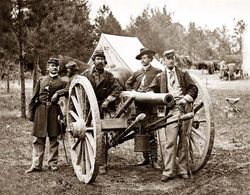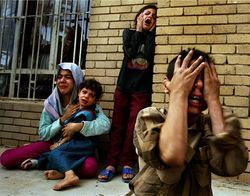The opening night’s attack, coolly dubbed a ‘campaign’, was broadcast live into American homes and even looked like a massively coordinated fireworks show. It would lead to the deaths of hundreds of thousands of Iraqi civilians, create millions of refugees, and cost the U.S. taxpayer over two trillion dollars. Many American politicians and commentators who had supported Bush that night, later criticized him on the grounds that they didn’t support this kind of war, one so badly executed. Bush should have sent in more troops and supplies, and planned ‘to win the peace’. In other words, they had supported an operationally smarter war. It is not enough to argue that Americans were lied to about Saddam’s nukes and links to al-Qaeda. With the same ‘evidence’, why did most Americans support the war—even reelecting Bush in 2004—when much of the world strongly opposed it?[2] Why is it that, as the historian Tony Judt put it, ‘the United States today is the only advanced democracy where public figures glorify and exalt the military’, where politicians ‘surround themselves with the symbols and trappings of armed prowess’? War is always spoken of as an option; to be averse to it is taken as a sign of weakness. Indeed, why are the Americans so much more jingoistic today than, say, the Europeans? I offer three reasons that I believe, taken together, provide an answer: (a) The demographics of the American military (b) Historical inexperience of war and the world, and (c) The impetus from corporate capitalism. These are not original lines of investigation by any means. My modest goal in this short essay is to develop them into my own synthesis, and hopefully provide food for further thought.
The idea of conscription, or mandatory service in the military, is rooted in a sense of civic virtue and community obligation. It is at least as old as the Athenian polis, which required military service from all citizens. But most nations today have a volunteer military. Serving in it is now a specialized profession like any other—only some men and women pursue it, the vast majority have nothing to do with it.
Historical Inexperience of War and the World
‘Indeed, the complacent neoconservative claim that war and conflict are things Americans understand—in contrast to naive Europeans with their pacifistic fantasies—seems to me exactly wrong: it is Europeans (along with Asians and Africans) who understand war all too well. Most Americans have been fortunate enough to live in blissful ignorance of its true significance.’[6] Europeans are also shrewder than Americans about non-Western societies—a byproduct of Europe’s geography, colonial empires, and in some ways, their salad-bowl model of immigration (vs. the melting pot, more conducive to assimilation). Their scholars, administrators, and civilians once spent years abroad, returning with knowledge that filtered into public awareness. They continue traveling to and otherwise engaging with former colonies. One might say that the world has already paid the price for educating the Europeans. And whether or not they like others, Europeans have a keener sense of others’ cultural complexities, and of this Kantian insight: ‘Out of the crooked timber of humanity, no straight thing was ever made.’ Keener than the Americans that is, whose relative naivete, insularity, and evangelical instincts (religious, political, and economic) only make them more vulnerable to demagogues who cry wolf about threats from foreign cultures. In a society of ‘AWOL’ upper classes, does the free market, the kind led by modern corporations, create its own impetus for war? How does America’s elite class—whose growing share of wealth depends on the relentless growth of corporations—safeguard its economic interests? Not usually through boardroom conspiracies, which surely happen, but by staying true to its dominant class character, like an animal who cannot help being any other way, whose one authentic instinct is to sustain and engorge itself. To that end, it uses every tool at its disposal.
Many like Chomsky have reminded us for decades that the corporate media largely serves the agendas and interests of dominant groups. It tends to employ company men and women who uphold their bosses’ values and viewpoints—not from coercion but consent, in exchange for some of the spoils. It promotes a libertarian gospel of the free market, with minimal regulation and taxation—a system that increases disparity and reduces the economic well-being of most people. It wouldn’t survive if most people didn’t also buy into the libertarian ideal of the autonomous individual, heroically forging his own economic destiny. (No wonder rags-to-riches stories are so admired.) This oddly persistent dogma—reinforced by the corporate control of films, TV, and books—helps lubricate the free market’s ravishing of social democracy and redistributive justice. It has managed to even turn Scandinavian-style ‘socialism’ into a filthy word fit to taint adversaries with. A classic case of the Foucauldian nexus of knowledge and power. U.S. corporations
now make almost half of their money from the rest of
the world. They also account for two-thirds of the international arms
shipments, mostly to the developing world, many to regimes guilty of
major ongoing human rights abuses.[9] As
global conflicts over markets and resources intensify,
the natural
interest of the economic elites is a world safe for
corporations. Towards this end, they hire lobbyists, grease political
campaigns, or enlist the help of the military.[10] U.S. garrisons now
occupy 700+
bases in 120 countries.[11] The trick that the
elites—including political elites who also dream of empire or need
diversions from domestic failings—instinctively practice
is this: sensing a threat to their own economic
interests abroad, they
whip up fear and hysteria about threats to the
‘American way of life’
from evil others.
And this is exactly what the corporate media artfully enables. War often boosts the economy (especially via the military-industrial complex) and is usually good for the media. About the only thing that might expose the U.S. public to the realities of war—showing the mutilated bodies of soldiers and civilians, shattered families, disabled vets, or the experiences of people on the ground—is conveniently classified, censored, ignored, or made taboo on the pretext of respecting privacy or excessive violence.[12] Can we imagine corporate media anchors calling the invasion of Iraq a crime against humanity? Or asking why so many Americans became Bush’s willing executioners? Or demanding a formal apology and reparations to Iraq for a war based on lies? The business of news has no room for those who might be led to wonder on which side of the gate roam the barbarians. Notes:
Source: shunya.net |





